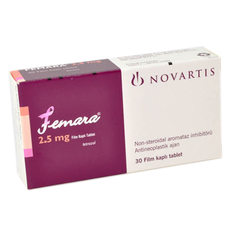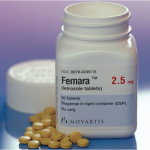Foods To Avoid While Taking Letrozole (Femara)

For most people, taking a new medication may mean switching up your lifestyle a bit and that includes the foods you eat. A food-drug interaction means that a specific nutrient or compound within the food changes the way your body metabolizes the medication, and this can either enhance or reduce the dose your body gets, according to Johns Hopkins Medicine. The potential results: an increased risk of side effects, many of which can be dangerous, or the drug not working as it was intended.
Before introducing a medication, ask your pharmacist about any food interactions, including with alcohol, and any adjustments you may have to make to your diet.

What is Letrozole?
Letrozole, more commonly known by the brand name Femara, is an aromatase inhibitor that is used to treat early breast cancer in women who have experienced menopause (change of life; end of monthly menstrual periods) and who have had other treatments, such as radiation or surgery to remove the tumor. It is also used to treat early breast cancer in women who have experienced menopause and who have already been treated with a medication called tamoxifen (Nolvadex) for 5 years.
Letrozole (Femara) is also used in women who have experienced menopause as a first treatment of breast cancer that has spread within the breast or to other areas of the body or in women whose breast cancer has worsened while they were taking tamoxifen.
Letrozole (Femara) can be an effective fertility treatment for women with ovulation problems, or for those with unexplained infertility.
How does Letrozole (Femara) work?
Letrozole is in a class of medications called nonsteroidal aromatase inhibitors. Letrozole (Femara) works by decreasing the amount of estrogen produced by the body. This can slow or stop the growth of some types of breast cancer cells that need estrogen to grow.
How should I take Letrozole (Femara)?
Letrozole (Femara) comes as a tablet to take by mouth once a day with or without food. Take Letrozole (Femara) at around the same time every day. Follow the directions on your prescription label carefully, and ask your doctor or pharmacist to explain any part you do not understand. Take Letrozole (Femara) exactly as directed. Do not take more or less of it or take it more often than prescribed by your doctor.
You may need to take it for several years or longer. Continue to take Letrozole (Femara) even if you feel well. Do not stop taking letrozole without talking to your doctor.
Ask your pharmacist or doctor for a copy of the manufacturer’s information for the patient.
Foods to Avoid When Taking Letrozole (Femara)
The following have been found to increase aromatase or estrogen or to reduce the effectiveness of Letrozole (Femara) and should be limited or avoided during treatment with Letrozole (Femara):
Alcohol: It’s best to avoid or limit alcohol intake when using breast cancer medications like Letrozole (Femara). Alcohol can raise your risk of experiencing side effects from Letrozole (Femara), such as hot flashes or joint pain.
Beef: Some studies have shown that red and processed meats may increase estrogen in the body, so limiting these foods may support estrogen regulation and enhance the effectiveness of Letrozole (Femara).
Chamomile tea: German chamomile might act like estrogen in the body. Exposure to chamomile can worsen hormone-sensitive conditions like breast cancer, uterine cancer, ovarian cancer, endometriosis, or uterine fibroids and limit the effectiveness of Letrozole (Femara).
Corn oil: The inclusion of corn oil in the diet increases the levels of cholesterol, progesterone, estradiol, and insulin. You should avoid corn oil while on Letrozole (Femara).
Grapefruit: Grapefruit & grapefruit juice should be avoided while on Letrozole (Femara). Preliminary evidence from animal studies shows that grapes may have an aromatase-inhibiting effect, decreasing estrogen synthesis and increasing androgen precursors.
Smoked meat or fish: Meats cooked at high temperatures, as are grilled, barbecued, and smoked meats, have long been associated with carcinogenic chemicals like polycyclic aromatic hydrocarbons.
Lemons & limes: Limes are a rich source of plant estrogens called isoflavones which can influence your levels of estrogen and affect how Letrozole (Femara) works.
Safflower oil: Fats in the diet, such as those found in safflower oil, are essential for hormone regulation and memory. But they can also influence hormonal balance so it’s best to avoid them while on Letrozole (Femara).
Soy Bean products: Soy protein isolate, soybean oil, soybean paste, and other soybean products should be avoided while on Letrozole (Femara). Soy is unique in that it contains a high concentration of isoflavones, a type of plant estrogen (phytoestrogen) that is similar in function to human estrogen but with much weaker effects. Soy isoflavones can bind to estrogen receptors in the body and cause either weak estrogenic or anti-estrogenic activity.
Sunflower oil: Sesame and sunflower seeds are among the highest of all estrogenic foods, consuming oil from these seeds while on Letrozole (Femara) can negatively affect how this medication works.





